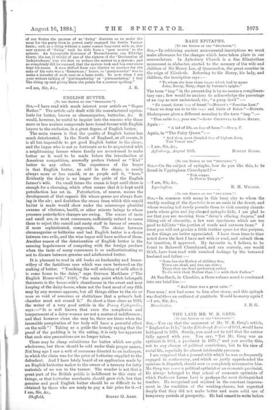ENGLISH BUTTER.
[TO THE EDITOR OF THE "SPECTATOR."]
have read with much interest your article on "Bogus Batter." The article only dealt with the manufactured equiva- lents for butter, known as oleomargarine, butterine, &c. It would, however, be useful to inquire into the reasons why these more or less noxious compounds have found favour with English buyers to the exclusion, in a great degree, of English butter.
The main reason is that the quality of English butter has much deteriorated. In the North of England, at all events, it is all but impossible to get good. English butter in the shops, and the buyer who is not so fortunate as to be acquainted with a neighbouring farmer whose family are accustomed to make butter as it used to be made before the introduction of American competition, avowedly prefers Ostend or "Kiel" butter to any other. The experience of the buyer is that English butter, as sold in the shops, is nearly always more or less rancid, or as people call it, " keen." Evidently the dairy is no longer the pride of the English farmer's wife. On small farms the cream is kept until there is enough for a churning, which often means that it is kept until putrefaction has set in. Putrefaction, of course, means the development of that organic life whose germs are always float- ing in the air ; and doubtless the cream from which this rancid butter is made would show under the microscope plentiful swarms of vibriones, bacilli, or other minute beings to whose presence putrefactive changes are owing. The senses of taste and smell are, in most consumers, sufficiently refined to cause them to reject this rancid and nasty stuff in favour of sweeter,
if more sophisticated, compounds. The choice between oleomargarine or bdtterine and bad English butter is a choice between two evils, and the wise buyer will have neither of them. Another reason of the deterioration of English butter is the seeming hopelessness of competing with the foreign produce 'when the taste of many consumers is so undiscriminating as not to discern between genuine and adulterated butter.
It is pleasant to read in old books on husbandry and house- wifery of the fastidious care which was once bestowed on the making of butter. "Touching the well ordering of milk after it is come home to the dairy," says Gervase Markham ("The English House-wife," 1649), " the main point which belongeth thereunto is the house-wife's cleanlinesse in the sweet and neat keeping of the dairy-house, where not the least moat of any filth may by any meanes appeare, but all things either to the eie or nose so void of sowernes or sluttishnes that a prince's bed- chamber must not exceed it." So short a time since as 1836, the writer of a very good article in the Penny Cyclopcedia, says :—" It is well known that even the complexion and temperament of a dairy-woman are not a matter of indifference ; and that however clean she may be, there are times when the insensible perspiration of her body will have a powerful effect on the milk " ! Taking as a guide the homely saying that the- proof of the pudding is in the eating, it is only too apparent that such nice precautions are no longer taken.
There may be cheap substitutes for butter which are quite wholesome, but these should be sold under their proper names. Not long ago I saw a writ of summons directed to an innkeeper, in which the claim was for the price of butteriue supplied to the defendant. And I have lately heard of an application made by an English butterine maker to the owner of a tannery for fatty
materials of no use to the tanner. The wonder is not that a great part of the British public is indifferent to this state of -things, or that butterine merchants should grow rich, but that genuine and good English butter should be so difficult to be obtained by those who are ready to pay a fair price for it.—I I am, Sir, &c.,


































 Previous page
Previous page